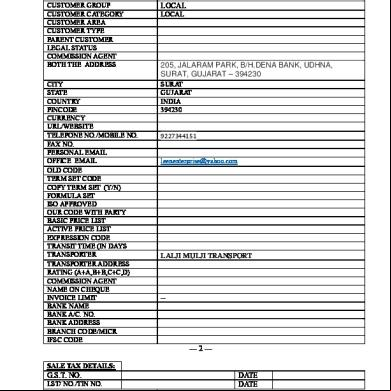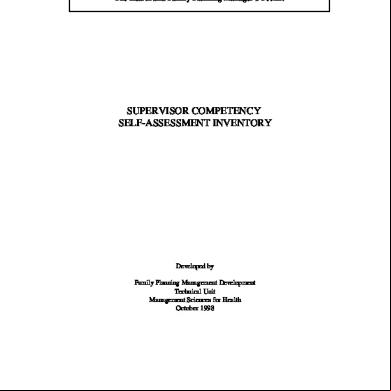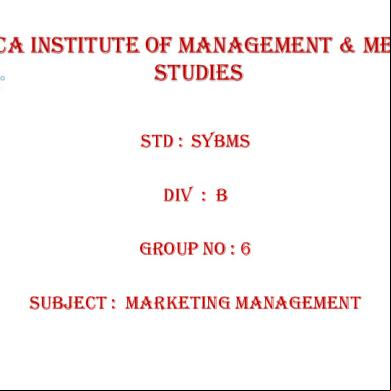22550642 Management Science Theory And Practice 597170
This document was ed by and they confirmed that they have the permission to share it. If you are author or own the copyright of this book, please report to us by using this report form. Report 3i3n4
Overview 26281t
& View 22550642 Management Science Theory And Practice as PDF for free.
More details 6y5l6z
- Words: 1,443
- Pages: 31
ESSENTIALS OF MANAGEMENT: An International Perspective Sixth Edition Weihrich and Koontz
Chapter 1. Management: Science, Theory, and Practice
© 2004 H. Weihrich
Chapt. 1. Management: . Science, Theory, Practice
1
After studying this chapter, you should understand 1. The nature and purpose of management. 2. That management applies to all kinds of organizations and to managers at all organizational levels. 3. That the aim of all managers is to create a "surplus" 4. That the nature of excellent and ired companies and their characteristics. 5 The trends in information technology and globalization. 6. The concepts of productivity, effectiveness, and efficiency. 7. That management as practice is an art in which the underlying theory and science are applied in light of situations. 8. The evolution of management and some recent contributions to management thought.
© 2004 H. Weihrich
Chapt. 1. Management: . Science, Theory, Practice
2
Definition of Management: Its Nature and Purpose • Management is the process of – – – –
deg and maintaining an environment in which individuals, working together in groups and efficiently accomplish selected aims.
© 2004 H. Weihrich
Chapt. 1. Management: . Science, Theory, Practice
3
The Functions of Management • The five managerial functions around which managerial knowledge are organized are: – – – – –
planning, organizing, staffing, leading, and controlling
© 2004 H. Weihrich
Chapt. 1. Management: . Science, Theory, Practice
4
Managerial Functions at Different Organizational Levels • No basic distinction is made between managers, executives, s, and supervisors • All managers carry out managerial functions. However, the time spent for each function may differ
© 2004 H. Weihrich
Chapt. 1. Management: . Science, Theory, Practice
5
Time Spent in Carrying Out Managerial Functions
© 2004 H. Weihrich
Chapt. 1. Management: . Science, Theory, Practice
6
. Managerial Skills and the Organizational Hierarchy The four skills for s are: • • • •
technical, human, conceptual, and design skills
© 2004 H. Weihrich
Chapt. 1. Management: . Science, Theory, Practice
7
The Goals of All Managers and Organizations • The aim of all managers should be to create a surplus. Thus, managers must establish an environment in which people can accomplish group goals with the least amount of time, money, materials, and personal dissatisfaction
© 2004 H. Weihrich
Chapt. 1. Management: . Science, Theory, Practice
8
Characteristics of Excellent Companies (Peters & Waterman) These firms * Were oriented toward action * Learned about the needs of their customers * Promoted managerial autonomy and entrepreneurship * Achieved productivity by paying close attention to the needs of their people * Were driven by a company philosophy often based on the values of their leaders * Focused on the business they knew best * Had a simple organization structure with a lean staff * Were centralized as well as decentralized, depending on appropriateness
© 2004 H. Weihrich
Chapt. 1. Management: . Science, Theory, Practice
9
Excellent Companies Adapt to Changes in the 21st Century • To be successful in the 21st Century, companies must take advantage of the new information technology - especially the Internet - and globalization • M-Commerce is mobile or wireless commerce
© 2004 H. Weihrich
Chapt. 1. Management: . Science, Theory, Practice
10
Definition of Productivity • Productivity is the output-input ratio within a time period with due consideration for quality
© 2004 H. Weihrich
Chapt. 1. Management: . Science, Theory, Practice
11
Definitions of Effectiveness and Efficiency • Productivity implies effectiveness and efficiency in individual and organizational performance • Effectiveness is the achievement of objectives • Efficiency is the achievement of the ends with the least amount of resources (time, money, etc.) © 2004 H. Weihrich
Chapt. 1. Management: . Science, Theory, Practice
12
Managing: Science or Art? • Managing as practice is an art; the organized knowledge underlying the practice may be referred to as a science
© 2004 H. Weihrich
Chapt. 1. Management: . Science, Theory, Practice
13
The Evolution of Management Thought & Patterns of Management Analysis • Frederick Taylor and Scientific Management • Fayol, the Father of Modern Operational Management Theory • Elton Mayo and F. Roethlisberger and the Hawthorne Studies • Recent Contributors to Management Thought
© 2004 H. Weihrich
Chapt. 1. Management: . Science, Theory, Practice
14
Taylor's Principles of Scientific Management 1. Replacing rules of thumb with science (organized knowledge) 2. Obtaining harmony in group action, rather than discord 3. Achieving cooperation of human beings, rather than chaotic individualism 4. Working for maximum output, rather than restricted output 5. Developing all workers to the fullest extent possible for their own and their company's highest prosperity
© 2004 H. Weihrich
Chapt. 1. Management: . Science, Theory, Practice
15
Fayol, the Father of Modern Operational‑Management Theory • Authority and responsibility. authority is a combination of official‑factors and personal factors • Unity of Command. Employees should receive orders from one superior only • Scalar Chain. A "chain of superiors" from the highest to the lowest ranks should be short‑circuited when to follow it scrupulously would be detrimental • Esprit de Corps. This is the principle that "in union there is strength" © 2004 H. Weihrich
Chapt. 1. Management: . Science, Theory, Practice
16
Elton Mayo and F. Roethlisberger and the Hawthorne Studies. • In general, that the improvement in productivity was due to such social factors as morale, satisfactory interrelationships between of a work group (a "sense of belonging"), and effective management--a kind of managing that would understand human behavior, especially group behavior, and serve it through such interpersonal skills as motivating, counseling, leading, and communicating © 2004 H. Weihrich
Chapt. 1. Management: . Science, Theory, Practice
17
Recent Contributors to Management Thought • • • • • • •
Peter F. Drucker Keith Davis Edwards Deming Joseph M. Juran Peter Laurence William Ouchi Thomas Peters and Robert Waterman
© 2004 H. Weihrich
Chapt. 1. Management: . Science, Theory, Practice
18
PATTERNS OF MANAGEMENT ANALYSIS: A MANAGEMENT THEORY JUNGLE? (1) the empirical, or case, approach, (2) the managerial roles approach, (3) the contingency, or situational, approach, (4) the mathematical, or "management science," approach, (5) the decision theory approach, (6) the reengineering approach, (7) the systems approach, © 2004 H. Weihrich
Chapt. 1. Management: . Science, Theory, Practice
19
PATTERNS OF MANAGEMENT ANALYSIS: -- continued (8) the sociotechnical systems approach, (9) the cooperative social systems approach, (10) the group behavior approach, (11) the interpersonal behavior approach, (12) McKinsey's 7‑S framework, (13) the total quality management approach, (14) the management process, or operational, approach. © 2004 H. Weihrich
Chapt. 1. Management: . Science, Theory, Practice
20
The Managerial Roles Approach (Mintzberg) • 3 Interpersonal roles • 3 Informational roles • 4 Decision roles
© 2004 H. Weihrich
Chapt. 1. Management: . Science, Theory, Practice
21
The Management Process, or Operational, Approach • This approach draws together the pertinent knowledge of management by relating it to the managerial job--what managers do • It tries to integrate the concepts, principles, and techniques that underlie the task of managing © 2004 H. Weihrich
Chapt. 1. Management: . Science, Theory, Practice
22
m ste y S
o he t s
ry
SSoocicoiolo loggyy/ /s soocciaia l lppssyy cchhoolo loggyy
y Ps o lo ch gy
on isi ec D eo th ry
Mat he
© 2004 H. Weihrich
a l ce c i in en Cl peri ex
mati cs Chapt. 1. Management: . Science, Theory, Practice
23
A Basic Input-Output Model
© 2004 H. Weihrich
Chapt. 1. Management: . Science, Theory, Practice
24
The Five Managerial Functions • • • • •
Planning Organizing Staffing Leading Controlling
© 2004 H. Weihrich
Chapt. 1. Management: . Science, Theory, Practice
25
Definition of Planning • Planning involves selecting missions and objectives and the actions to achieve them; it requires decision making
© 2004 H. Weihrich
Chapt. 1. Management: . Science, Theory, Practice
26
Definition of Organizing • Organizing involves establishing an intentional structure of roles for people to fill in an organization
© 2004 H. Weihrich
Chapt. 1. Management: . Science, Theory, Practice
27
Definition of Staffing • Staffing involves filling, and keeping filled, the positions in the organization structure
© 2004 H. Weihrich
Chapt. 1. Management: . Science, Theory, Practice
28
Definition of Leading • Leading is influencing people so that they will contribute to organization and group goals
© 2004 H. Weihrich
Chapt. 1. Management: . Science, Theory, Practice
29
Definition of Controlling • Controlling is measuring and correcting individual and organizational performance to ensure that events conform to plans
© 2004 H. Weihrich
Chapt. 1. Management: . Science, Theory, Practice
30
The Systems Model of Management and This Book
© 2004 H. Weihrich
Chapt. 1. Management: . Science, Theory, Practice
31
Chapter 1. Management: Science, Theory, and Practice
© 2004 H. Weihrich
Chapt. 1. Management: . Science, Theory, Practice
1
After studying this chapter, you should understand 1. The nature and purpose of management. 2. That management applies to all kinds of organizations and to managers at all organizational levels. 3. That the aim of all managers is to create a "surplus" 4. That the nature of excellent and ired companies and their characteristics. 5 The trends in information technology and globalization. 6. The concepts of productivity, effectiveness, and efficiency. 7. That management as practice is an art in which the underlying theory and science are applied in light of situations. 8. The evolution of management and some recent contributions to management thought.
© 2004 H. Weihrich
Chapt. 1. Management: . Science, Theory, Practice
2
Definition of Management: Its Nature and Purpose • Management is the process of – – – –
deg and maintaining an environment in which individuals, working together in groups and efficiently accomplish selected aims.
© 2004 H. Weihrich
Chapt. 1. Management: . Science, Theory, Practice
3
The Functions of Management • The five managerial functions around which managerial knowledge are organized are: – – – – –
planning, organizing, staffing, leading, and controlling
© 2004 H. Weihrich
Chapt. 1. Management: . Science, Theory, Practice
4
Managerial Functions at Different Organizational Levels • No basic distinction is made between managers, executives, s, and supervisors • All managers carry out managerial functions. However, the time spent for each function may differ
© 2004 H. Weihrich
Chapt. 1. Management: . Science, Theory, Practice
5
Time Spent in Carrying Out Managerial Functions
© 2004 H. Weihrich
Chapt. 1. Management: . Science, Theory, Practice
6
. Managerial Skills and the Organizational Hierarchy The four skills for s are: • • • •
technical, human, conceptual, and design skills
© 2004 H. Weihrich
Chapt. 1. Management: . Science, Theory, Practice
7
The Goals of All Managers and Organizations • The aim of all managers should be to create a surplus. Thus, managers must establish an environment in which people can accomplish group goals with the least amount of time, money, materials, and personal dissatisfaction
© 2004 H. Weihrich
Chapt. 1. Management: . Science, Theory, Practice
8
Characteristics of Excellent Companies (Peters & Waterman) These firms * Were oriented toward action * Learned about the needs of their customers * Promoted managerial autonomy and entrepreneurship * Achieved productivity by paying close attention to the needs of their people * Were driven by a company philosophy often based on the values of their leaders * Focused on the business they knew best * Had a simple organization structure with a lean staff * Were centralized as well as decentralized, depending on appropriateness
© 2004 H. Weihrich
Chapt. 1. Management: . Science, Theory, Practice
9
Excellent Companies Adapt to Changes in the 21st Century • To be successful in the 21st Century, companies must take advantage of the new information technology - especially the Internet - and globalization • M-Commerce is mobile or wireless commerce
© 2004 H. Weihrich
Chapt. 1. Management: . Science, Theory, Practice
10
Definition of Productivity • Productivity is the output-input ratio within a time period with due consideration for quality
© 2004 H. Weihrich
Chapt. 1. Management: . Science, Theory, Practice
11
Definitions of Effectiveness and Efficiency • Productivity implies effectiveness and efficiency in individual and organizational performance • Effectiveness is the achievement of objectives • Efficiency is the achievement of the ends with the least amount of resources (time, money, etc.) © 2004 H. Weihrich
Chapt. 1. Management: . Science, Theory, Practice
12
Managing: Science or Art? • Managing as practice is an art; the organized knowledge underlying the practice may be referred to as a science
© 2004 H. Weihrich
Chapt. 1. Management: . Science, Theory, Practice
13
The Evolution of Management Thought & Patterns of Management Analysis • Frederick Taylor and Scientific Management • Fayol, the Father of Modern Operational Management Theory • Elton Mayo and F. Roethlisberger and the Hawthorne Studies • Recent Contributors to Management Thought
© 2004 H. Weihrich
Chapt. 1. Management: . Science, Theory, Practice
14
Taylor's Principles of Scientific Management 1. Replacing rules of thumb with science (organized knowledge) 2. Obtaining harmony in group action, rather than discord 3. Achieving cooperation of human beings, rather than chaotic individualism 4. Working for maximum output, rather than restricted output 5. Developing all workers to the fullest extent possible for their own and their company's highest prosperity
© 2004 H. Weihrich
Chapt. 1. Management: . Science, Theory, Practice
15
Fayol, the Father of Modern Operational‑Management Theory • Authority and responsibility. authority is a combination of official‑factors and personal factors • Unity of Command. Employees should receive orders from one superior only • Scalar Chain. A "chain of superiors" from the highest to the lowest ranks should be short‑circuited when to follow it scrupulously would be detrimental • Esprit de Corps. This is the principle that "in union there is strength" © 2004 H. Weihrich
Chapt. 1. Management: . Science, Theory, Practice
16
Elton Mayo and F. Roethlisberger and the Hawthorne Studies. • In general, that the improvement in productivity was due to such social factors as morale, satisfactory interrelationships between of a work group (a "sense of belonging"), and effective management--a kind of managing that would understand human behavior, especially group behavior, and serve it through such interpersonal skills as motivating, counseling, leading, and communicating © 2004 H. Weihrich
Chapt. 1. Management: . Science, Theory, Practice
17
Recent Contributors to Management Thought • • • • • • •
Peter F. Drucker Keith Davis Edwards Deming Joseph M. Juran Peter Laurence William Ouchi Thomas Peters and Robert Waterman
© 2004 H. Weihrich
Chapt. 1. Management: . Science, Theory, Practice
18
PATTERNS OF MANAGEMENT ANALYSIS: A MANAGEMENT THEORY JUNGLE? (1) the empirical, or case, approach, (2) the managerial roles approach, (3) the contingency, or situational, approach, (4) the mathematical, or "management science," approach, (5) the decision theory approach, (6) the reengineering approach, (7) the systems approach, © 2004 H. Weihrich
Chapt. 1. Management: . Science, Theory, Practice
19
PATTERNS OF MANAGEMENT ANALYSIS: -- continued (8) the sociotechnical systems approach, (9) the cooperative social systems approach, (10) the group behavior approach, (11) the interpersonal behavior approach, (12) McKinsey's 7‑S framework, (13) the total quality management approach, (14) the management process, or operational, approach. © 2004 H. Weihrich
Chapt. 1. Management: . Science, Theory, Practice
20
The Managerial Roles Approach (Mintzberg) • 3 Interpersonal roles • 3 Informational roles • 4 Decision roles
© 2004 H. Weihrich
Chapt. 1. Management: . Science, Theory, Practice
21
The Management Process, or Operational, Approach • This approach draws together the pertinent knowledge of management by relating it to the managerial job--what managers do • It tries to integrate the concepts, principles, and techniques that underlie the task of managing © 2004 H. Weihrich
Chapt. 1. Management: . Science, Theory, Practice
22
m ste y S
o he t s
ry
SSoocicoiolo loggyy/ /s soocciaia l lppssyy cchhoolo loggyy
y Ps o lo ch gy
on isi ec D eo th ry
Mat he
© 2004 H. Weihrich
a l ce c i in en Cl peri ex
mati cs Chapt. 1. Management: . Science, Theory, Practice
23
A Basic Input-Output Model
© 2004 H. Weihrich
Chapt. 1. Management: . Science, Theory, Practice
24
The Five Managerial Functions • • • • •
Planning Organizing Staffing Leading Controlling
© 2004 H. Weihrich
Chapt. 1. Management: . Science, Theory, Practice
25
Definition of Planning • Planning involves selecting missions and objectives and the actions to achieve them; it requires decision making
© 2004 H. Weihrich
Chapt. 1. Management: . Science, Theory, Practice
26
Definition of Organizing • Organizing involves establishing an intentional structure of roles for people to fill in an organization
© 2004 H. Weihrich
Chapt. 1. Management: . Science, Theory, Practice
27
Definition of Staffing • Staffing involves filling, and keeping filled, the positions in the organization structure
© 2004 H. Weihrich
Chapt. 1. Management: . Science, Theory, Practice
28
Definition of Leading • Leading is influencing people so that they will contribute to organization and group goals
© 2004 H. Weihrich
Chapt. 1. Management: . Science, Theory, Practice
29
Definition of Controlling • Controlling is measuring and correcting individual and organizational performance to ensure that events conform to plans
© 2004 H. Weihrich
Chapt. 1. Management: . Science, Theory, Practice
30
The Systems Model of Management and This Book
© 2004 H. Weihrich
Chapt. 1. Management: . Science, Theory, Practice
31










